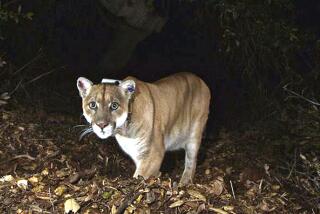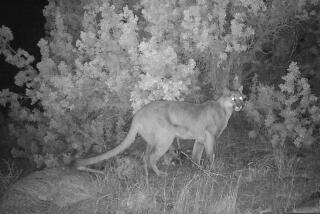Former Tejon Ranch hunting guide says mountain lions were killed illegally at the ranch
Reporting from Gorman, Calif. -- The California Department of Fish and Game is investigating claims in a whistle-blower lawsuit filed by a former Tejon Ranch employee who alleges that he was fired after he complained about the illegal killing of mountain lions at the company’s direction.
“There appears to be legitimate cause for an investigation, which has begun,” said Patrick Foy, a spokesman for Fish and Game.
Bron Sanders, a former hunting guide at the ranch, made the claims in a lawsuit filed on May 3 in Kern County Superior Court. Sanders worked at the ranch from 2004 until December of last year, when, he alleges, he was wrongfully terminated for complaining to ranch managers and top executives about illegal hunting of the wild predators on the grounds.
In an interview on Friday, Sanders said the killings were motivated by angry sentiments among ranch managers toward a 1990 law that made hunting mountain lions illegal in California. He said managers also blamed mountain lions for feasting on game prized by trophy hunters who pay up to $20,000 to shoot elk on the historic 270,000-acre ranch, about 60 miles north of Los Angeles.
“In the 6½ years I worked on the ranch, I never saw one state Department of Fish and Game warden on the property,” Sanders said.
Tejon Ranch officials denied the allegations.
“We learned of Mr. Sanders’ allegations only after he became aware that he was being terminated for cause,” said Tejon Ranch spokesman Barry Zoeller. “After learning of the allegations, we conducted a thorough investigation internally and had all parties involved interviewed by outside counsel. Based on that investigation and those interviews, we determined that the allegations were ridiculous and untrue.”
Over the last five years, Sanders said in an interview, he personally witnessed “20 mountain lions dead on the ground without a depredation permit.” The exact figure Sanders cited was not noted in his lawsuit.
Each state-issued permit restricts the killing to one big cat that poses a threat to humans or livestock. Under state law, the carcass of a mountain lion killed under the auspices of a depredation permit must be presented to the state Department of Fish and Game within 24 hours.
A violation of permit requirements is a misdemeanor punishable by imprisonment in the county jail for up to one year or a fine of up to $10,000 or both.
Sanders said his problems started in July 2005, after he killed his first mountain lion on the ranch with a depredation permit to do so.
But he alleged that when he called in to report the kill, Sanders said, Don Geivet, vice president of Tejon Ranch operations, told him, “Don’t call anyone about this, and do not turn that carcass in.”
Sanders said, “We got two to three mountain lions with that one permit.”
That incident was among several listed in Sanders’ lawsuit. For example, the lawsuit says that a few months before Sander’s termination, Darrell Francis, the oldest hunting guide on the ranch, used a small-caliber rifle to shoot a mountain lion 12 times without a depredation permit.
In an interview, Francis denied the allegation. “It’s a bunch of hooey,” he said. “The only time I ever hunt mountain lion is when there is a depredation permit.”
The lawsuit alleges that another hunting guide, Leo Fisher, “has treed and killed over 30 lions on the ranch in the past several years, mostly without depredation permits.”
Fisher denied the allegations and called Sanders “a bald-faced liar.”
Geivet also declined to comment on allegations in the lawsuit, including that he was “not only well aware of the unlawful mountain lion hunting, he actively encouraged the conduct.”
According to the lawsuit, Sanders was removed from hunting activities late last year, after he complained about the killings of mountain lions. He lost his job a day after Robert Stine, president and chief executive officer of Tejon Ranch, learned about his allegations of illegal hunting and retaliation.
“The thrust of this lawsuit is that my client was being directed to hunt mountain lions,” Costa Mesa attorney Erik McLain said in an interview. “When he complained about it, he was fired.”
More to Read
Sign up for Essential California
The most important California stories and recommendations in your inbox every morning.
You may occasionally receive promotional content from the Los Angeles Times.











